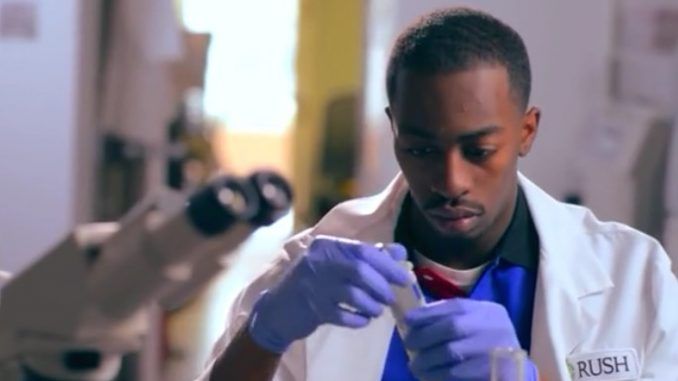
Colon cancer is the third leading cause of cancer-related deaths in the world, with 1.4 million cases diagnosed in 2012.
A Chicago teenager named Kevin Stonewall, who lost friends and family to the disease, created the world’s first vaccine at Rush University’s lab, and it proved to be 100 percent effective on mice. The vaccine is now being developed for testing on humans.
“A lot of people are impacted by cancer. So I felt it was my role to step up and do something about it,” Stonewall says in the video below.

BYPASS THE CENSORS
Sign up to get unfiltered news delivered straight to your inbox.
You can unsubscribe any time. By subscribing you agree to our Terms of Use
Riseearth.com reports:
The results of his research were presented at the national meeting for the Society for ImmunoTherapy of Cancer in Washington, D.C., and he is listed as lead author.
As DNAInfo.org reports, Stonewall has spent the last year at the University of Wisconsin in Madison, where as a sophomore he has been further researching a colon cancer vaccine that may “possibly down the road eradicate colon cancer.”
It was after reviewing research suggesting that a chemotherapeutic agent might help kill off other kinds of cancer cells – and promote a healthy immune response – that Stonewall set out to test whether the potential colon cancer vaccine worked on both younger and older mice.
He used a high concentration of mitoxantrone — a prescription drug that treats certain types of cancers, and administered this potential vaccine to young and old mice, and then injected the vaccinated mice with aggressive colon cancer cells.
Stonewall’s task was then to measure responses, including the makeup of key immune cells called dendritic cells, as well as tumor growth and survival rates.
After three days of living with the vaccine, Stonewall noticed that all of the young mice’s tumors were eliminated. They also demonstrated immunity to colon cancer. None of the older mice were protected, however, leading to tumor growth.
At present, Stonewall’s research has helped determine a need for a vaccine that would work on older subjects, say scientists. Because two-thirds of colon cancer patients are elderly, this finding is clinically important.
Stonewall “should be heralded for helping to develop more effective colon cancer treatments that will impact the elderly, the population that is most susceptible to colon cancer,” said Carl Ruby, the Rush University professor who operated the lab where Stonewall did his research. “He has all the tools. He will go far.”
Watch the video above created by Intel to visually grasp the young man’s breakthrough.


Good work, I hope he lives, unlike most researchers who develop cancer treatments, to see his vaccine administered to humans. Cancer develops when a cell is deprived of 60% of it’s needed oxygen. Keep the blood well oxygenated, and cancer can’t develop.